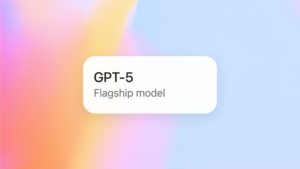GPT-5 Just Dropped: OpenAI’s Latest AI Is Scary Good, Wildly Profitable—And Still Falls Short of Human
OpenAI’s GPT-5 isn’t just another AI—it’s a revenue-generating beast that still can’t quite fake being human. Here’s why the hype (and the stock bumps) might be overblown.
The Good: It Prints Money
Early adopters are already throwing cash at GPT-5’s uncanny ability to draft contracts, write code, and even mimic your ex’s texting style. OpenAI’s revenue? Let’s just say Sam Altman isn’t sweating his next round of funding.
The Bad: It’s Still a Robot
For all its brilliance, GPT-5 still stumbles over sarcasm, forgets context like a goldfish, and occasionally suggests solving existential crises with to-do lists. So much for world domination.
The Ugly: Wall Street’s Blind Faith
Investors are piling into AI stocks like it’s 1999—never mind that GPT-5’s ‘breakthroughs’ are mostly incremental. But hey, who needs due diligence when FOMO pays better dividends?
Bottom line: GPT-5 is impressive, profitable, and a stark reminder that Silicon Valley’s ‘human-like AI’ still needs a human to fix its mistakes. Maybe buy the dip—just don’t expect it to write your breakup note.

OpenAI says GPT-5 outclasses its predecessors in four key areas:
Users willing to hand over Gmail, Calendar, and Contacts can let ChatGPT act as a digital concierge, booking tables, ordering gifts, or gently reminding you that your mother-in-law’s birthday is coming.
On top of text, image, and voice generation, GPT-5 now claims a bedside manner: it will proactively flag possible health concerns. OpenAI insists it’s not a doctor replacement, but you can bet millions will treat it like Dr. Chat anyway.
Altman’s hedged bet on AGI
Sam Altman, OpenAI’s CEO, hailed GPT-5 as “generally intelligent” yet admitted it’s still “missing something quite important, many things quite important.” Chief among the gaps: true continuous learning. Today’s model freezes at deployment; it doesn’t iterate on fresh data in real time like, say, you doom-scrolling Twitter.
That caveat matters because OpenAI’s own definition of AGI involves outperforming humans at “most economically valuable work.” Until the system can learn on the fly, the finish line remains blurry, and conveniently movable.
Jobs on the chopping block
If you’re billing by the hour in an air-conditioned office, brace yourself. Dario Amodei of Anthropic recently mused that half of all entry-level white-collar roles could vanish within five years. Lawyers, accountants, junior bankers, anyone whose job boils down to reading, summarizing, and regurgitating, should polish their résumés with verbs like “prompt-engineering.”
GPT-5’s soft-skills revamp might even erode the moat around therapists and life coaches, though Nick Turley, OpenAI’s ChatGPT lead, assures us the model is now “significantly less sycophantic.” Translation: it won’t just echo your bad ideas back at you with heart-eye emojis.
Follow the money
Investors, smelling trillion-dollar upside, are throwing cash at anything that whispers “AGI.” Rumor has it OpenAI is arranging a secondary share sale that could peg its valuation at $500 billion, above SpaceX and closing in on Visa. Remember, the company doesn’t sell widgets; it sells tokens and $200-a-month Pro subscriptions. Free users get throttled, which feels a bit like test-driving a Ferrari with the speed limiter on.
Elsewhere, Google’s DeepMind teased an unreleased “world model,” while Meta’s Mark Zuckerberg claimed superintelligence is “now in sight.” It’s a sprint, a marathon, and a PR spectacle rolled into one, fuelled by cloud-compute contracts and fear of missing out.
The contrarian take
Yes, GPT-5 is a leap. But calling it “generally intelligent” feels like congratulating a calculator for passing kindergarten arithmetic. Real-world intelligence isn’t just about spitting out code snippets or haikus on demand; it’s about forming durable mental models, updating them continuously, and acting autonomously in messy environments. Until a model can learn mid-conversation, persuade a cat to take its medicine, or file quarterly taxes without exploding, humans still have a tenuous edge.
OpenAI’s own admission that GPT-5 lacks online learning underscores the point: this is still a static brain in a dynamic world. Impressive, yes. Autonomous, no.
Where we go next
Expect a flood of GPT-5-powered copilots grafted onto every productivity suite imaginable. Expect regulators to fret about deepfake phone scams that sound exactly like your CEO. And, inevitably, expect GPT-6 rumors by Christmas, because in AI, nothing ages faster than last quarter’s breakthrough.
For now, savor the novelty: a chatbot that flatters you less, codes a little cleaner, and only occasionally pretends to know things it doesn’t. Just don’t hand over your livelihood to it quite yet. To borrow Altman’s words, we’re “missing something quite important.” Odds are, that something is still us.

